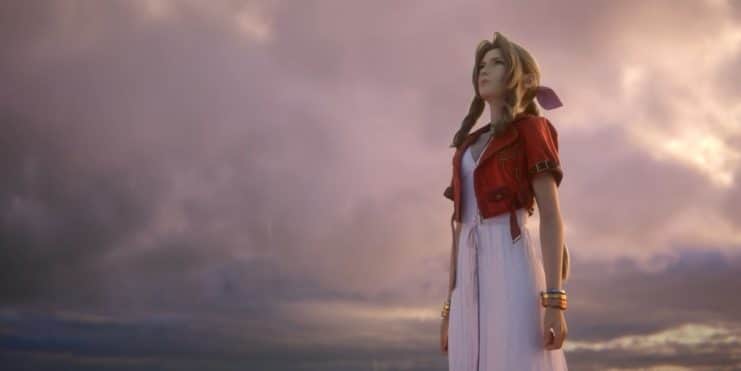

In Final Fantasy VII, Aeris has more than intuitions: it perceives the future possibilities that no one else can see. But where do these visions come from … and why only she can hear them?
On several occasions, Air It shows signs of knowing things that others do not know, with the omens that warn the pain that is coming. This article threatens its role in the trilogy in a deep and symbolic way Remake Final Fantasy VIIbased on personal theories: everything is hypothetical and nothing is officially confirmed by ENIX Square.
What does the crossing between Zack transports the cloud and the group that leaves Midgar at the end of the Final Fantasy VII remake?
Zack’s plan transporting the cloud, shown in parallel at the time the group leaves Midgar, does not represent a current event, but An emotional memory or an echo of the moment in which Zack is about to be killed.


Why does it rain at that moment and Aeris says he hates heaven?
According to the interview with Nomura, for Aeris the sky represents pain, loss and trauma. The game associates it with:
Zack’s death, the loved one.
The loss of her mother, Ifalna.
The sky covered by the Shinra plate, which represents oppression.
The origin of Jenova, who came from the sky and brought its people to ruin, the cetra.


At the time it rains at the end of Remake Final Fantasy VIIThese emotional associations are reactivated in Aeris. Rain is not simply a climatic condition: it is a symbolic manifestation of accumulated pain, the crossing of memories, death and fate. That Aeris says “I hate heaven” at that moment not only expresses his pain for what has been experienced, but his refusal of a cycle of tragedies that he feels repeated.
The rain can also be an echo of Zack’s death (remember that in the basic crisis, it rains when he dies), connecting that pain to the reality that Aeris still perceives unconsciously, as if his soul remembers something that his mind cannot yet explain.


Why does the white question of Aeris become transparent after the battle against Omen?
Hit Omen It does not bring liberation, but rupture:
The vital current is fragmented after breaking the karmic wall.
Sacred He loses his emotional energy; There is no resonance to protect.
THE White matter It is disconnected from its purpose, empty, as a container without essence.


It can also be seen that simply in the climax of Final Fantasy VII remake, The echoes end up stealing the memories or knowledge that Aeris had.
Network XIII and loss of chatter
In the appointment of Golden saucer In Final Fantasy VII RebirthRed XIII describes that he and Aeris had a connection with the planet that allowed them to perceive the fragments of the future, but which weakened after the remake events of Final Fantasy VII. It is not an exact knowledge, but the profound intuitive sensitivity. And even if it is not a cetra, Red XIII has been sensitive to vital current. Both have lost part of that perception, probably due to the interference of the echoes.




Echoes: Guardians of fate or manipulation?
En Final Fantasy VII Rebirth, Begins to sow doubts actively about the nature and purpose of the echoes. In the remake of Final Fantasy VII, we are presented a very partial vision: the echoes seem to act to preserve certain events, but it is not explained why or for what. In Rebirth, narrative changes: the characters (such as Red XIII and Bugenhagen) begin to question the role of the echoesWhat could indicate:
That the version of the “destination” imposed by the echoes is not authentic, but an illusion or manipulation.
That echoes are not agents of the planet or Lifestreame, but a strange force, perhaps corrupt or misrepresented.
That the concept of destination they present is a trap or a fraud to ensure that the characters behave useful for a hidden entity (Sephiroth? Jenova?).




“There is no pre -anesto destiny,” says Bugenhagen
This is a key statement. Bugenhagen is a figure of wisdom and connection with the Lifestreame and if it denies the existence of a “pre -installed destiny”, it implies this:
The planet does not impose closed destinations.
The experience of Red XIII and Aeris with the echoes was an anomaly, not part of the natural order.
The existence of echoes was somehow artificial, perhaps even a distortion caused by a force outside the world, and therefore its purpose is questioned.


Network XIII says “Echoes Echoes”
This dialogue is not accidental. Doctors anger, frustration and contempt for the original echoes. They are not treated as allies of the planet, but as thieves of knowledge and free will. This could strengthen my theory:
Red XIII does not seem to consider them guardians of the good, but an enemy force, which left him blind to the future.


This indicates that the echoes could also be enemies of the planet, masked by order agents.
The appointment between Red XIII and Cloud: doubt, loss of clarity
When Red XIII doubts and no longer remembers what were the echoes, and when Cloud doubts also to say “Didn’t you say they were the guardians of fate?” The game is introducing a deliberated ambiguity. This performs different functions:
It also starts to challenge the player everything he thought he understood in the remake of Final Fantasy VII.
It presents the possibility that the echoes were not what they said they were, but something more sinister.
And above all, it strengthens a key idea: the “fate” that the protected echoes could have been the plan of Sephiroth, and the heroes continued to believe that they had done the right thing.


So … the echo could be a farce?
With what we know until the rebirth of Final Fantasy VII, the hypothesis that the echoes are not custodians of fate, but a manipulation – positively of Sephiroth or Jenova – to force a certain path has a lot of weight.
Indeed:
In Final Fantasy VII Rebirth, Sephiroth seems to have more freedom and knowledge of the protagonists themselves.
Aeris and Red XIII had chatter (even if it is limited or more spiritual than literal), but the echoes have stolen it. Why would a neutral force be for the benefit of the villain?


The trilogy is a sequel because Aeris “do you know what will happen”?
Many fans think that, but my point of view is another:
Although Aeris has intuitions and omens, he does not have a complete knowledge of the future.
Its clairvoyance is partial, emotional and symbolic, not the omniscience of a temporary traveler.
If he knew everything, his silences, doubts and sacrifices would lose dramatic load.




The trilogy is better framed as a symbolic reinterpretation or in another way, a reimagination of the story told in 1997. This is shown so far does not seem to adapt as a literal sequel to Adventit Children or the original game.
Conclusion
The clairvoyance in the trilogy is not an absolute prerogative, it is not an exact knowledge, but a profound intuitive sensitivity.
The echoes, far from being a benevolent fabric, could have been a under cover manipulation to guide the group towards the script that Sephiroth wanted.


This article offers a reading in which Aeris does not have all the control, but struggles to support what little remembers and feels. It does not intend to offer an absolute truth, but to offer a symbolic door to another interpretation of history.
If you want to know more about the Final Fantasy VII remake trilogy, click on the following titles
White matter and black material in Final Fantasy VII: a symbolic journey through the planetary soul
The Sephiroth plan in the Remake Final Fantasy VII trilogy
Sephiroth in the Remake Final Fantasy VII trilogy: Will, Convergence and Control of the Soul
Remake Aeris and Final Fantasy VII trilogy, Clairvoyance, planetary consciousness and uniform soul

